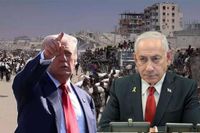For months, rumors have swirled about a dramatic new vision for Gaza’s future. Now, with a leaked 38-page prospectus in hand, the world is getting a closer look at the Trump administration’s controversial plan to reshape the battered enclave into a gleaming, high-tech “Riviera of the Middle East”—but only after the vast majority of its Palestinian population is relocated, at least temporarily, and the region is rebuilt from the ground up.
The plan, officially titled the Gaza Reconstitution, Economic Acceleration and Transformation Trust—or GREAT Trust—has been circulating within the Trump administration as of September 3, 2025, according to The Washington Post. Its details are as staggering as they are contentious: under the proposal, Gaza would be placed under a U.S.-led trusteeship for at least a decade, its two million residents either “voluntarily” departing or being moved into restricted zones while the enclave is transformed into a network of AI-powered smart cities, logistics hubs, and luxury developments.
According to OAN, the prospectus envisions Gaza as a Mediterranean hub for manufacturing, trade, data, and tourism, leveraging its strategic location, workforce, and access to markets. The plan is supported by Israeli technology and investments from Gulf Cooperation Council states, with Saudi Arabia and other wealthy Gulf nations expected to play a major role as financial backers. The proposed timeline is ambitious, with the transformation expected to unfold over a decade or longer.
The GREAT Trust was reportedly drafted by some of the same Israelis behind the controversial Gaza Humanitarian Foundation, whose food aid distribution points have been the site of alleged massacres and chaos as desperate civilians sought relief amid ongoing conflict. Financial modeling for the project was performed by a team then working for Boston Consulting Group, though the firm later disavowed the work and terminated two senior partners involved, The Washington Post reports.
Central to the plan are up to ten so-called “megaprojects,” including six to eight AI-powered smart cities, a regional logistics hub to be built atop the ruins of Rafah, a highway named after Saudi Crown Prince Mohammed bin Salman, and an “Elon Musk Smart Manufacturing Zone.” The infrastructure wish list also features large-scale solar and desalination plants, a U.S. data safe haven, and “Gaza Trump Riviera & Islands,” modeled on Dubai’s Palm Islands. The plan promises to include residences, commerce, light industry, hospitals, schools, clinics, and more.
But the human cost and controversy surrounding the plan are impossible to ignore. Under one scenario, about 75% of Gaza’s current population would remain in the strip during its transformation; another proposal involves up to 500,000 Gazans relocating to third countries, 75% of them permanently, though the prospectus does not specify which countries or how many Palestinians would ultimately be forced to leave. Those who agree to relocate would receive a $5,000 cash payment, four years of subsidized rent, and one year of subsidized food—a package that critics say amounts to little more than a thinly veiled incentive for ethnic cleansing.
Landowners in Gaza would be offered digital tokens by the trust in exchange for redevelopment rights, which could be used to start new lives elsewhere or eventually redeemed for apartments in the new smart cities. Returning families would be offered ownership of 1,800-square-foot apartments valued at $75,000 each, according to The Washington Post. The plan allocates $6 billion for temporary housing inside Gaza and $5 billion for those who choose to relocate.
Financially, the plan is as bold as its vision. The prospectus claims the project would require $70 billion to $100 billion in public investment, triggering an additional $35 billion to $65 billion in private investment, with state-backed companies from Saudi Arabia and other Gulf states expected to play a leading role. The proposal projects nearly fourfold returns on investment and annual revenues of $4.5 billion within a decade. Major international corporations—from construction giants like the Saudi Bin Laden Group and infrastructure specialists like IKEA, to tech titans such as Amazon and Tesla, and hotel chains including Mandarin Oriental and IHG—are all named as potential beneficiaries.
Yet, as Common Dreams notes, the plan’s strategic benefits for the U.S. are also spelled out in the document: it would allow Washington to “strengthen” its “hold in the east Mediterranean and secure U.S. industry access to $1.3 trillion of rare-earth minerals from the Gulf.”
Not everyone is convinced by the plan’s promises. Josh Paul, a former U.S. State Department official who resigned in 2023 over arms sales to Israel, called the proposal “essentially a new form of colonialism, a transition from Israeli colonialism to corporate colonialism.” The prospect of “voluntary” transfer—long seen by Palestinians as a euphemism for ethnic cleansing—has drawn fierce criticism. While a recent survey by the Palestinian Centre for Policy and Survey Research found that nearly half of Gazans would consider Israeli assistance to relocate, many say they would never leave their homeland, where most are descendants of survivors of the 1948 Nakba.
“I’m staying in a partially destroyed house in Khan Younis now,” one Gazan man told The Washington Post. “But we could renovate. I refuse to be made to go to another country, Muslim or not. This is my homeland.”
The plan’s rollout comes amid a catastrophic humanitarian crisis in Gaza. According to Gizmodo, the death toll in Gaza now exceeds 60,000, with women and children accounting for about half of the dead and another 145,870 wounded. A recent Brown University study found that Israel has killed more journalists in the past two years than in all major wars since the U.S. Civil War combined. On September 1, 2025, the world’s leading genocide scholars’ organization declared that Israel was committing genocide in Gaza.
Meanwhile, the Trump administration has taken further steps to isolate Palestinian leadership on the world stage. On September 3, 2025, Secretary of State Marco Rubio announced a visa ban on Palestinian Authority officials, preventing them from attending the upcoming U.N. General Assembly session. Rubio cited the PA’s alleged failure to repudiate terrorism, including the October 7 massacre, as justification—a claim disputed by observers who note that the PA has repeatedly condemned terrorism and is at odds with Hamas, the group responsible for the attack.
The timing of the visa ban is widely seen as an effort to undermine the PA’s campaign for international recognition of Palestinian statehood, which has garnered support from more than 145 nations and is expected to be formally recognized by France, Great Britain, Australia, and Canada at the U.N. session. Despite the ban, PA representatives at the U.N. mission in New York will still be able to attend, as U.N. rules prohibit their exclusion.
As Israel prepares for a new offensive to occupy all of Gaza, the international community has grown increasingly alarmed. No country approached to take in the displaced Palestinian population—including South Sudan—has agreed to participate. With famine and destruction spreading, Israel’s standing has eroded even among longtime allies, and the Trump administration’s moves to block diplomatic avenues have only heightened global alienation.
Whether the GREAT Trust plan ever becomes reality remains an open question. For now, it serves as a lightning rod for debates over colonialism, investment-driven reconstruction, and the future of a people caught between war and the promise—or threat—of a radically reimagined homeland.


